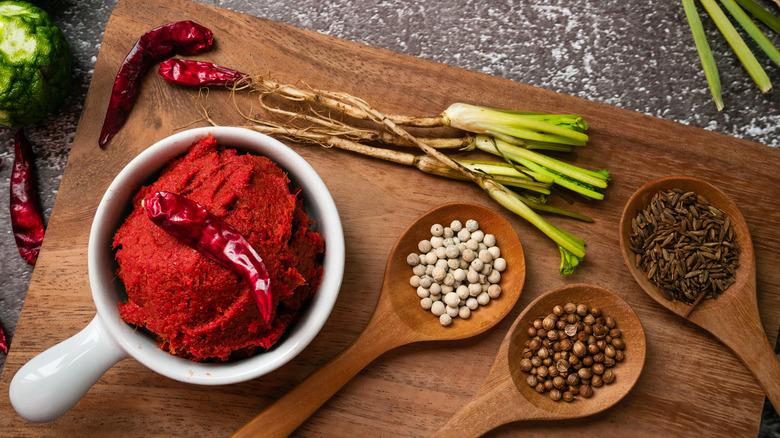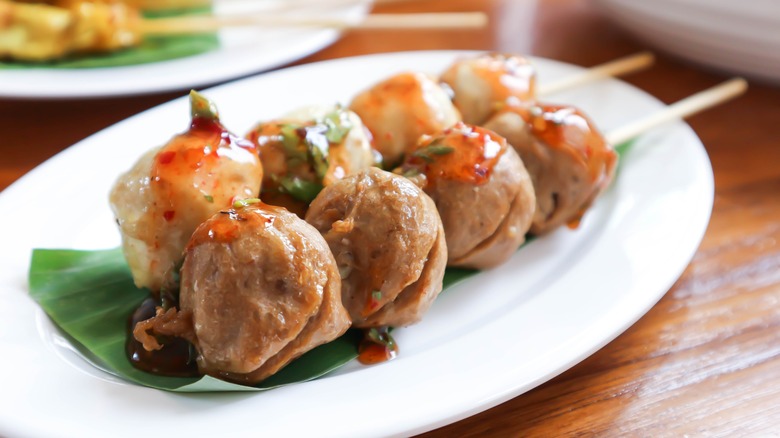What Makes Thai Meatballs Unique Is All In The Add-Ins
Meatballs are among the dishes that hold universal appeal. Who among us hasn't relished in marinara-sauce-drenched Italian classic meatballs, indulged in the creamy Swedish version, or eaten the Middle Eastern rendition known as kofta? If you're in the mood for something unique, give Thai meatballs a try. As similar as they may look to regular meatballs, one bite will reveal their distinctive taste that's created by a beautiful add-in blend of staple Thai ingredients.
Thai food is all about finding harmony within versatile and intense flavors, so don't be surprised when you taste spicy, sweet, sour, salty, and even herby fragrance all in one dish. For meatballs and their fillings, in particular, some of these notes are brought about by the cuisine's specialty condiments. They derive boldness from Thai curry paste (think red or green) that offers a spicy, herbaceous complexity and diverse nuances across different varieties. An umami undertone, on the other hand, often comes from fish sauce, but soy sauce and shrimp paste are also great picks.
Layered underneath the initial flavor burst are the aromatics that give the dish exquisite subtleties. Lemongrass, ginger, and galangal are go-to choices for Thai dishes, and they work like a charm in giving the meatballs a citrusy, peppery kick. Kaffir lime leaves — a tom yum soup must-have — also make a great addition thanks to their zesty freshness. Last but not least are the herbs. Just a pinch of cilantro, coriander, or Thai basil can give your dish an extraordinary depth.
The sauce also makes a difference
The sauce plays a huge role in making Thai meatballs as outstanding as they are. With curry paste as one of the main ingredients, it makes perfect sense to incorporate into the recipe its foolproof companion: coconut milk. Simmer the two together with chicken stock, fish sauce, lime zest, and aromatics to make a curry sauce. The spicy richness perfectly ties in with the meatballs. Plus, it coats the tender meat in a lusciousness that makes the dish even more irresistible.
Also dearly beloved in the realm of Thai cuisine is peanut sauce. Although more commonly enjoyed with skewered food, you might find it to be just as delectable with meatballs. Here, essentials such as curry paste, fish sauce, aromatics, and coconut milk (or cream) are still needed, only now joined by peanut butter and chili paste. Together, they make a sweet and creamy sauce with a delightful nutty tone to complement the overall savory profile.
For those who just want to keep the focus on the meatballs, a sweet chili sauce is all it takes. You'll need water, vinegar, sugar, garlic, cornstarch, and some spice, such as crushed red peppers or Thai chilies. A few minutes of them simmering on the pan will give you a spicy-sweet dip to accompany the dish.
Complete your Thai meatballs with other simple ingredients
Since the Thai meatballs are already laden with unique and hearty flavors, you will only need a simple Asian side dish to complete the main course. Rice is perhaps one of the most valued ingredients in Thai meals. In the case of meatballs, it helps to mellow out some of the bigger flavors and adds a filling quality, rounding out the whole meal. Jasmine rice is a favorite for many, but you can also try other types of rice, some of which call for different cooking methods. Go with coconut rice to tie in with the curry sauce or basmati rice for a nutty, floral touch. Or just keep it simple with regular white rice.
That said, you're more than welcome to opt for noodles, rice noodles, or rice vermicelli if you prefer their silky smooth texture. For those looking to tone it down on the carb content, zoodles (zucchini noodles) are a solid choice.
On the lighter side, consider serving the meatballs on a bed of veggies. They could be lettuce, cabbage, bok choy, or anything else you want. Garnished with chopped Thai basil or scallions and accompanied by a dipping sauce, it's a fresh feast that guarantees a flavorful eating experience.


